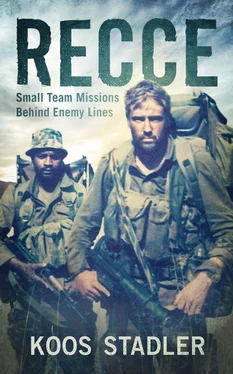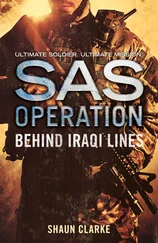I flicked the compass open and faced south to find the back bearing of our approach to the apron. As I fixed the compass reading and looked up at the night sky to find a suitable star, I saw the Southern Cross, or Crux. At that moment it was at the apex of its pathway through the sky, pointing vertically down and almost inviting us to follow it. We both looked up at the constellation of stars and realised it was the third cross in as many nights to make an unexpected but major impact on us.
It was strangely comforting – to follow the cross amid the commotion erupting around us. The enemy was now obviously looking for us, apparently strengthening their defences around the aircraft, as we could hear a number of vehicles moving into position. We moved quickly, following the Southern Cross and going low through the shrubs, once again avoiding the cluster of bunkers we had encountered earlier.
As we approached the perimeter, slowly and very quietly, Diedies again urged from the back: “You must find the hole, Kosie, we cannot cross over…”
We reached the road where the patrol had passed by earlier, but the reaction apparently hadn’t reached this far. In the direction of the tarmac we could hear vehicles and voices as the enemy started coordinating their search. I brought my gaze down from the Southern Cross, and suddenly spotted the hole in the fence right in front of us, squarely on our bearing.
We wasted no time in getting through to the relative safety of the brush outside. In a matter of seconds we had passed through and soon were back at the railway line. Diedies insisted we sit down to reassess the situation. We were both immensely relieved as the realisation dawned how we had been led to a safe exit.
“What about the trains?” I whispered. “Shall we move along the railway line and blast some locomotives?”
Diedies didn’t even consider it for a moment. “It’s either the aircraft or nothing,” he answered. “We don’t want to spoil any future chances, and it wasn’t the aim of the operation in any case.”
For Diedies, second best would never do. The first principle of war – the maintenance of the aim – was non-negotiable. We either did the job we had come for, or we accepted failure. Much later, when we debriefed and carefully relived the operation, and once again weighed our chances of success, I realised how important was this principle. It would not have made sense to divert the focus to a lesser target with no bearing on the bigger war effort – especially in a situation where the defeat was tangible and the need to obtain some sense of achievement was overwhelming.
We moved quickly back along the tracks. With all the excitement we had not kept track of time, and we knew that we had to be out of the area before first light, as a search would certainly be launched. We once again passed the Cuban base, but this time it was dead quiet.
At the foot of the mountain we took a short rest. We scrambled up and tried to call Da Costa on the Tacbe. As we approached the point where we had left him the previous night, he suddenly answered, and we gave the “all clear” password. He appeared out of the darkness from under a tree and said he had been listening to us scramble up the mountainside, but was not sure whether it was own forces or not. After Diedies briefly filled him in on the night’s events, he had the same reaction as I did: wasn’t there any other target? Couldn’t we stick around and find something else to destroy? Should we simply turn back empty-handed?
There wasn’t any time to argue the point, and, even though it weighed heavily on our minds, we all knew withdrawal was our only option. Da Costa led the way to the bamboo thicket and we repacked our equipment after disarming the charges. He then set up the radio while we sorted out our kit. Dave Scales responded immediately when Da Costa sent the familiar clear call in Morse. He had clearly been sitting by the radio the whole night. Amazingly, despite the odd hour, we had a full signal.
Dave asked if he should “pull” us, triggering the two radios into frequency-hopping mode. Da Costa responded with a “dah-dit, dah-dah-dah” – meaning no. Dave then wanted to know if everyone was okay and whether we were together, to which Da Costa responded in the affirmative. Then came the question everyone at the Tac HQ anxiously wanted an answer to: “Successful with your enterprise?” To this our man answered with a very deliberate “dah-dit, dah-dah-dah”.
After asking a few more questions Dave was satisfied that Da Costa was not communicating under duress. He understood that we were moving out and that the next sched would only be by late afternoon.
We donned our anti-track covers and moved out in a southwesterly direction, still deeper into the mountain. I set a fast pace, as we wanted to clear the immediate area where, in the morning, the enemy would likely search with helicopters. Every now and again we encountered small villages or farmsteads in the valleys, which we took care to avoid.
Where the terrain allowed, we spread out and anti-tracked as well as we could, considering the speed of our retreat. At some point we passed beneath a cluster of trees in what appeared to be some kind of an orchard. The familiar smell of fresh guavas filled my nostrils, and I reached up in the dark to touch some of the fruit. We stopped for a moment to grab a handful each. Most of the guavas were ripe and delicious. We munched down a few, and then stuffed our pockets before moving off again.
Like that time during Junior Leader training when I passed through an orange grove, it was an invigorating moment. It completely revitalised us in body and spirit. We were in high spirits after eating the guavas, in spite of our failure and the likelihood that every FAPLA and Cuban soldier in southern Angola was looking for us.
We moved on and just kept going, hour after hour. At mid-morning a shower of rain erupted. We made good use of the downpour, and were thankful that the few tracks we might have left were now obliterated. Only late that afternoon, when the rain had subsided and our clothes started to dry on our bodies, did we stop for a cup of coffee and something warm to eat. Far off to the northeast we could hear aircraft and helicopter movement, but, except for a few MiGs passing high overhead, no aircraft came any closer.
We travelled through most of that night, but were too tired to keep up the pace and slept for a few hours before daybreak. We found good cover on a rocky outcrop, and carefully listened throughout that day for any reaction. We knew the enemy would search further from their base, and would likely apply the tactic – which all three of us had encountered before – of dropping off soldiers to patrol dry river beds or set up OPs in areas where they could dominate the terrain.
On the third morning we reached the pick-up point, having walked more than 60 km in the rough terrain. We used the whole day to watch the LZ area, as we didn’t want our helicopters to run into trouble. Our pick-up arrived just before last light and the three of us jumped into the first helicopter, as we were much lighter than during the infiltration. The pilot told us that Oom Boet Swart was on board the second helicopter and conveyed his greetings. We then settled into the job of watching out for enemy aircraft. I got a fright when I suddenly saw a fighter against the skyline, but the crew reassured us that they were our own Impalas escorting the helicopters.
Once we crossed the border into South West Africa, we veered left and headed for Ruacana, while the second helicopter had to go back to Opuwa to pick up the forward Tac HQ established for the pick-up. We refuelled at Ruacana and then flew back to Ondangwa where a feast awaited us at Fort Rev.
We sat down to our meal as the second helicopter came in, and waited for Oom Boet to make his grand entry. But then someone came rushing in to say there had been an accident – Boet Swart had been run over by a helicopter. We rushed out to the apron and found Oom Boet in a pool of blood on the tarmac. The doors had been opened while the aircraft was still moving and Boet, recognising the familiar lights of Fort Rev in front of him, thought they had come to a standstill. He descended the steps and fell – directly in front of the aircraft’s wheel. Gees Basson, fortunately a very experienced pilot, pulled up immediately when he felt the obstacle, not realising it was Oom Boet. This ensured that Oom Boet was not crushed by the full weight of the helicopter.
Читать дальше












